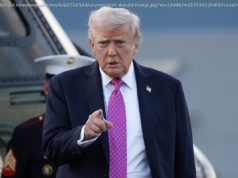Republicans are writing a bill that will stimulate the economy in the middle of an expansion — and automatically depress it during a downturn.
On Monday night, President Trump argued that American corporations are doing historically well — and also, are in desperate need of giant, deficit-financed tax cuts.
In most cases, Trump’s incoherent tweets reveal nothing more than the limitations of his “ very good brain. ” But in this instance, the president has actually, eloquently articulated the incoherence of the Republican tax plan itself.
There are reasonable arguments for reducing America’s corporate tax rate, as part of a revenue-neutral reform package that maintains the tax code’s progressivity: Our statutory corporate rate is abnormally high. This encourages companies to relocate to other nations, and/or invest time and money in tax evasion. And that ends up eroding the corporate tax base, leaving America with fewer jobs and our government with less revenue.
This story’s one that reputable economists across the political spectrum tell, though you can quibble with it. But Republicans aren’t trying to finance a modest reduction in the corporate rate by closing loopholes used predominately by the rich; they’re trying to finance a gargantuan, 15-point cut in the corporate rate, by adding $1.5 trillion to the deficit and raising taxes on some upper-middle-class people in blue states .
Even if one accepts the ( largely discredited) premises of the GOP’s favorite economists, there is still no coherent argument for this policy. In fact, in a Wall Street Journal op-ed this week, America’s leading conservative economists tacitly admitted as much: Before arriving at the conclusion that the GOP tax plan would increase growth by between 3 and 4 percent, the economists first “assumed a revenue-neutral corporate tax change.” This is because a deficit-financed cut would raise future interest rates — and thus, dampen the policy’s growth effects, even under classic, supply-side assumptions. In other words, in order to endorse the Republican bill, conservative economists had to pretend that it is an entirely different piece of legislation.
But the GOP’s few, sincere deficit hawks in the Senate aren’t ready to play make-believe, just yet. Oklahoma senator James Lankford and Tennessee’s Bob Corker have been pushing to add a “trigger or backstop ” to the bill, which would automatically increase taxes if the cuts produce less growth than expected — and, on Tuesday afternoon, Corker announced that he had reached an “outline on an agreement” with the Senate leadership on such a provision.
Corker’s proposal is a god-awful idea — but it’s one that Republicans can’t effectively rebut without admitting that their tax cut (probably) won’t do what they claim it will.
On Monday, GOP senator Pat Toomey argued that adding a “backstop” could be self-fulfilling — if businesses aren’t certain that their taxes will stay low, they’ll make fewer investments, and thus, growth will be weaker than expected. There are a couple flaws in this argument: One, so long as the United States is not an authoritarian country, corporations will never be certain that a different Congress won’t raise their taxes. Second, it’s hard for Republicans to argue that corporate tax cuts produce inevitable, predictable growth effects — and that the “job creators” (who, according to GOP orthodoxy, understand the economy better than anyone) don’t necessarily believe that.
The best argument against a deficit-reducing “backstop” though, is that recessions exist. Unfortunately for GOP lawmakers, this is also one of the best arguments against their entire tax plan.
Some Senate Republicans seem to understand this problem. As Politico reports:
Here, conservative lawmakers tacitly admit that governments need to run deficits during economic downturns: The reason a “legislative trigger” would potentially damage the economy is that during times of low consumer spending, it’s counterproductive for the government to take money out of people’s pockets.
Raising taxes when growth is slow, or nonexistent, will only slow the economy further. And the same holds for cutting most forms of public spending (cutting Americans’ health-care subsidies won’t get them to spend more on discretionary goods). Therefore, when revenues fall due to poor economic conditions, the government needs to have fiscal room to run short-term deficits. This analysis isn’t just supported by mainstream economic theory. It was also validated in the wake of the 2008 crash: Countries that responded to the crisis with stimulus (like the United States) came out far better than those that those that pursued austerity (like Britain).
This is why it’s impossible for anyone to credibly claim that they want to reduce the national debt and, also, pass the GOP’s tax plan. There is no fiscally conservative argument for adding hundreds of billions of dollars to the deficit at a time when the stock market is at record highs and unemployment near record lows. If Republicans cared about the debt, they would be pushing to cut it now — austerity will be far more painful when the economy (inevitably) falls back into recession.
But the GOP, writ large, does not care about the deficit. The party’s primary concern is ensuring that corporate America gets a return on its political investments. Republicans aren’t pushing a giant, regressive, deficit-financed business tax cut because they think such a policy meets the specific needs of the 2017 economy. They’re pushing it because 2017 is the year they happened to gain full control of the federal government; they lack the votes to pass significant spending cuts or middle-class tax increases; and their party exists to consolidate wealth and power into the hands of its well-heeled benefactors.






